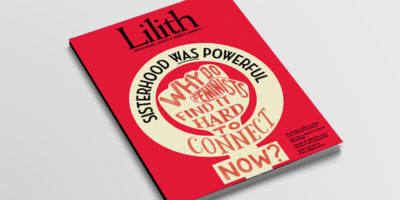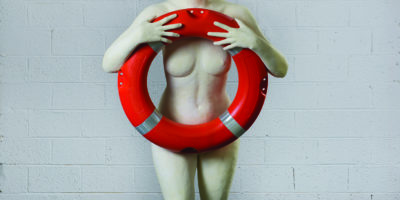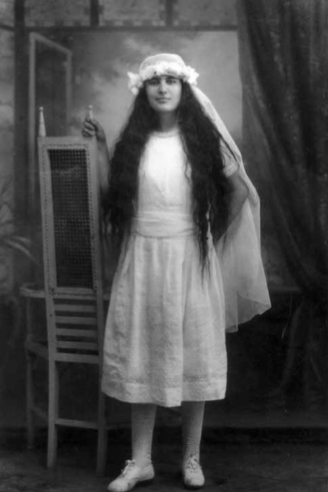
Bride Price: Alexandria, Egypt, 1926
Reviewing the family saga: What happened when her mother was sold into marriage for the sake of the family’s return to Jerusalem? Believe it or not, it’s a 20th-century tale.
I am sitting beside my mother’s bed where she now spends all her days, hearing the story of her betrothal for the very last time. Her apartment is on Tchernichovsky Street, in Jerusalem’s Rasco neighborhood, facing the olive tree-studded Valley of the Cross and the hill topped by the sprawling, white complex that is the Israel Museum. It is 1999.
As usual, I’ve pulled one of the padded, green-metal kitchen chairs up next to her bed. It is mid-afternoon and a rectangle of sun rests on my mother’s blanket, warming her knees. As she talks, I add small details, and she asks, “How you know that?” in her broken English.
“Eema,” I say. “I’ve heard this story my whole life.”
“Oh. Really?”
She couldn’t have forgotten that she’s told me this, but the narrative remains one that she still can’t seem to wrap her head around — even now, as she eases towards death. Perhaps she thinks that telling it one more time will somehow spring her from disbelief. Or is it trauma?
“You remember why we was in Alexandria?” she begins.
“Yes, Eema. The Turks threw you out of Jerusalem,” I say.
“Can you believe they make me marry this way?” she asks, for the zillionth time.
“No, Eema. I cannot. I cannot believe they made you marry this way.”
My mother is seven or eight, or maybe six, when her family — consisting of herself, her widowed mother, and her older brother (her father died shortly after the family made aliyah from Bukhara) — is exiled from Palestine to Egypt during World War I, along with thousands of others (including David Ben Gurion) who do not have Turkish citizenship.
She studies at the Alliance Israelite Universelle, part of an international group of liberal Jewish schools based on the values of the French Revolution and aimed at bringing “culture” to Eastern Jews. My mother’s family is so impoverished, though, that she is forced to quit school after the eighth grade so she can bring in money.
“We was so poor that when I saw another child eating chocolate, I would close my eyes and try to taste what she was tasting.”
“I know.”
She is exceptionally proficient at embroidery and lacework, so she gets a job back at her own school, teaching girls almost her age. They sit in a circle.
“Around me are many girls that I have to show them. I already knew so well. You understand?”
One day in 1926, my mother’s brother, Moshe Nissim (“Moses of the Miracles” — his mother added the second name when he survived a bout of childhood pneumonia) appears at the door of her classroom in the company of a debonair-looking man, someone she has never seen before. His name is Chai Moussaioff, her brother tells her. He’s 44 and a gentleman. It is highly unusual for Moshe Nissim to interrupt her at her job.
(Here, reader, I must provide a little backstory.)
My father’s family, the Moussaioffs, immigrated to Jerusalem from Bukhara in 1888. My father, Chai, the third child of Rabbi Shlomo and Esther Moussaioff, is five at the time. Rabbi Shlomo, my grandfather, is a wealthy merchant of precious stones, silks, teas, and spices. He is also a learned Jew. He’d been the student of the renowned Rabbi Chaim Gaon, a hasid of the kabbalistic Bet El school, and I imagine my grandfather was a very impressive student, as he later became Rabbi Chaim’s son-in-law.
On one of his not infrequent trips from Bukhara to Jerusalem, Rabbi Shlomo buys a large tract of land outside the Old City walls, and, to encourage aliyah, he offers to sell parcels, at cost, to any member of his community willing to “ascend” to The Holy Land. He is one of the founders of the Bukharian Quarter, one of the earliest Jewish neighborhoods outside the Old City — only a short drive, in fact, from where I now sit with my mother. Unlike the other narrow, winding streets of Jerusalem, Rehovoth HaBukharim (“the wide spaces of the Bukharians”) has straight, wide boulevards that were considered the height of luxury.
The neighborhood model, designed by a German engineer, consists of large buildings made from signature Jerusalem stone, surrounding a courtyard. My grandfather constructs “our” courtyard here: Besides building an apartment for his own family and apartments for extended family, too, he builds two apartments that are explicitly intended for the poor, a house of study for the community, and a synagogue (that to this day exists as something of a pilgrimage site, with round-the-clock minyanim). He also creates a garden comprised of dozens of species of exotic flora that becomes renowned, as does his extensive collection of rare kabbalistic manuscripts that are today housed at Bar Ilan University.
In any case, it is hard to make a living in Jerusalem, so my father’s eldest brother heads to Paris, and Chai, my father, when he comes of age, petitions his father to do the same.
“First you must marry,” his father tells him.
His parents find him a woman named Pnina and they leave for France. Pnina and my father proceed to produce five children.
“When Father lived in Jerusalem,” my half-sister Vicki tells me later, “he was so religious that if he accidentally brushed up against a woman on the street, he washed his hands. Not once, Ruthie. Twice! But then, in Paris…he discovered women.”
My father becomes a man of the world, visiting the United States often on business, becoming a naturalized US citizen, and learning eight languages. I know almost nothing about his first marriage — some say that Pnina was an undignified match for a scion of the clan Moussaioff — but I do know that after they divorce, my father has an affair with a French Jewish businesswoman and they have a son they name Leon. (I have another brother named Leon, too.) My father and this businesswoman stay together until Leon is one; then my father leaves Paris with all five of his and Pnina’s children.
One day in Jerusalem — it is 1926 at this point — Chai takes a Shabbat afternoon walk to the home of a Bukharian friend whose daughter, it turns out, has just received a photo-postcard from a childhood friend who was exiled to Egypt during the Great War.
My father stands behind the divan as the photograph is passed hand-to-hand. The photo stops him short.
“That was my picture,” my mother tells me.
Here is a dark-eyed beauty, a vision all in white: thick, wavy, dark hair topped with a gauzy white cap, hair falling below the waist. Her filmy white dress reaching just below her knees; her legs covered, modestly, in white stockings. Even her shoes are white. She looks calmly, steadily, at the camera. Innocent, matter-of-fact.
“Who is this girl?” my father asks.
“Sivia Babayoff,” his host answers. “The daughter of Chinee and Rabbi Yehuda, of blessed memory, who died before the war. Sivia’s mother, a good, pious woman, took in other people’s laundry here in Jerusalem so the family wouldn’t go hungry.”
My father is riveted. “Continue, please,” he says.
“In 1915, the Turks, may their names be erased, came to Chinee’s house, saying they wanted her son for the army. They came to many Bukharians this way, as you know, Chai, but Chinee had only one son, so she refused. They put her in jail, but Rabbi Abbo intervened, so they released her. The condition was that she, and her children, leave the country that night, on the train from Jaffa to Alexandria.”
My father is smitten by the photo. He wants this Sivia.
The mid-1920s is a down-time for my father financially. Though he deals in rare gems, he has no jewelry at the moment to offer as a bride price.
“You know how Abba was with money. Sometimes up. Sometimes down,” my mother says.
His name is good, though, so he borrows jewelry from other dealers — family and friends. What woman, after all, can resist rubies and diamonds and pearls?
“He come right away to Alexandria. He doesn’t wait.”
Within the week, my father, dressed in his best three-piece suit and carrying the jewels and a letter of introduction from his friend, arrives in Alexandria. He drops his small suitcase at the Shepherd’s Hotel and heads straight for the Bukharian synagogue where he knows he will find my mother’s brother, Moshe Nissim, at morning prayers. With the name Moussaioff, my father needs no further introduction. Moshe Nissim’s eyes light up when he hears it.
They go to a coffee house after shacharit and speak for a couple of hours. My father takes out the jewels — this part might be my own embellishment; I am no longer sure. A diamond ring, a gold bracelet, two strands of pearls, a ruby brooch, all set in fine 14- and 24-karat gold. He does not tell Moshe Nissim they are all borrowed.
My uncle is in shock — Is this a fairytale? A scion of the Moussaioff dynasty wants his impoverished teenaged sister’s hand? — but they negotiate. A shidduch in return for my uncle’s family’s return to Jerusalem, an apartment, a job for himself, respectable support of his widowed mother. It is agreed. They push back their chairs, stand, shake hands, and go off to meet my unsuspecting mother.
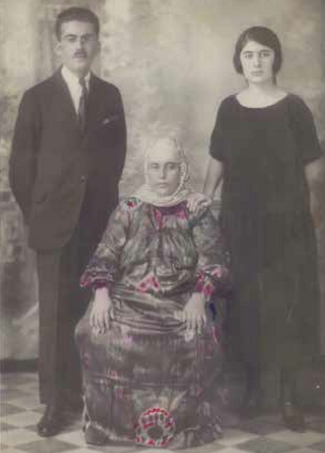
Moshe Nissim, Chinee, and Sivia Babayoff
“They came to the place where I was. It was afternoon….”
Sivia’s back is to the door.
A student has just said, “No, teacher. That was too fast. Can you show me again?” and Sivia does, bending from her waist over the student’s work, her shapely bottom filling the outline of her dress.
I am not certain here, but I think my father, the taller one, has an ivory-tipped walking stick and that he puts his finger to his lips. He is enjoying the scene. He thinks, ‘She is not only beautiful from the front!’ He also thinks, ‘She looks the same age as the others, yet she is the teacher. I have chosen well.’
After a moment, my father gestures and Moshe Nissim leads him into the classroom.
“Sivio,” my uncle calls, pronouncing it Bukharian-style, with the accent on the last syllable. Sivia straightens, turns around. She is puzzled by the intrusion. Her brother has never come to her classroom before. And who is this older, elegant gentleman? A gentleman he certainly is. She can tell by his regal suit, by the way that he holds himself.
She glances to make sure her girls are all busy stitching, then she curtsies.
“Mademoiselle, would you be so kind as to accompany me to the shops to choose some gifts for my children in Jerusalem?” Sivia looks at Moshe Nissim. He nods his head.
She has no idea what this is about, but she looks at her brother who gives an assenting nod.
“I will be happy to,” she says.
They shop for presents as soon as school is out. I wish I had asked my mother what they bought. She would certainly have remembered. I know that my father liked to buy silk stockings for Victoria, his favorite daughter, but what might he have bought for Bernard and Jack? for Rachelle and Henriette?
They stop at the shouk where my father buys a live carp for my grandmother to prepare in the family’s tiny apartment.
Meanwhile…Moshe Nissim has rushed home to tell his mother everything. She listens with her hand on her heart. Could this be happening? A Moussaioff wants to marry her daughter?
“Good thing I didn’t let that poor boy Kalantar have her!” she says.
Several hours later my father walks through the Babayoffs’ door with a fish wrapped in newspaper.
“You brought us fish, you brought us mazal!” my grandmother announces.
She takes the wrapped package from my father and puts it in the tin basin in the corner of the room. Moshe Nissim makes the introductions. She then returns to the fish, unwrapping the newspaper. A whole, meaty cod, bigger than she ever could have bought. The silver scales shiny, the eyes bright. This fish was alive not an hour ago, she thinks. Truly, mazal.
My grandmother is shy in front of this dapper stranger who is closer in age to her than to her daughter. A Moussaioff. A prominent family. Wealthy. Learned. Leaders of the Bukharian Jerusalem community.
“You have brought a blessing into our house,” she tells him, looking shyly at
the floor.
“May you always know only blessings,” my father says in return. He takes one of her hands and kisses it. My grandmother does not know what to do, how to react. No one has touched her since her husband Yehuda, alav ha’shalom, died 14 years earlier.
“Sit,” she says, smoothing down her dress with both hands. “I’ll make Turkish coffee, then we will enjoy this good fish.”
She sends my mother to the pump for water and begins to scale the fish, holding it by its tail and scraping in long strokes away from her into the basin.
‘This is from the Holy One, blessed be He,’ she thinks. ‘It could be the end of our troubles. Fourteen years I have worked to feed us. I have never bought a fish like this.’ Her hands move joyfully and her heart rises within her.
Soon the small kitchen is filled with the aroma of fresh fish frying — thin slices cut with the bone. When it is brown and crisp, they eat it, glazed with a sauce of fresh lemon, minced garlic, and coriander leaves chopped fine.
“How long did the negotiation take?” I ask my mother.
“I don’t know. I didn’t know nothing. He come to us two times.”
There is a good chance that my father brings lamb for pilau during this second visit, as this is a popular Bukharian rice dish that poor people, like my grandmother, would only have made with chicken. Chai presents my mother with the borrowed jewels and states that he wants her hand in marriage.
My mother is shocked. She has no idea that the gentleman has come for this. Here is a man her father’s age. Confused, she looks to her mother. Her brother, of course, has already told their mother that Chai Moussaioff will bring them all back to Jerusalem, will care for her, and will find him a job and an apartment. They will be his family now.
“When he come the second time, I cry,” my mother tells me. “I say, ‘I don’t want. I don’t want to get married. I don’t want a man like this.’ My mother hug me, she say, ‘Ochi mura’ — ‘I would die for you.’
“She say, ‘I wish you don’t have to. I wish I could give myself instead.’ She say to me, ‘We’re here. We’ll never be able to go to Jerusalem.’ She say, ‘They big family. He bring us back to Jerusalem.’
“What could I do? We was poor. I was naïve, young, I didn’t know. I don’t forget this.”
When my mother gets to this part of the story, I always try to put myself in her shoes: sold into an arranged marriage. To a stranger twice her age with five teenaged children. And she’s a teenager, too! If she said No she would be responsible for her family’s poverty, and perhaps worse, for keeping them in exile in Egypt. Fate has given her an opportunity. Can she really say no? Can she be selfish? He is a man she does not love.
“You want I should talk about my mother? Ha. My mother. She say, ‘He from a good family. He take care of you. He bring us back to Jerusalem.’ She say, ‘He good. He bring us fish. Fish bring mazal.’
“When I cry, my mother also cry. She say, ‘What we do here in Egypt?’ My mother she sacrifice herself, never marry after my father die — she don’t want us suffer from a step-father. Blame my mother? I don’t blame her; I feel sorry for her. I blame my brother.
“So in the end, I say, ‘Okay, I sacrifice myself for my mother.’
“She hug me. She cry. I cry.”
My parents marry in Jerusalem in the presence of the American Consul General on December 25, 1926.
“Why was the American Consul there, Eema?” I ask.
“I think because Abba American citizen,” she says. “And he Moussaioff.”
“And how come he had American citizenship?”
“It’s a long story. Another time.”
“Eema, how did you feel when you got married?”
“How I feel? How you think I feel?”
She will not say more.
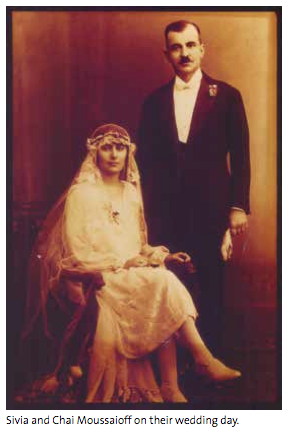 I take out the album and we look together, across the blanket, at their wedding photo. I try to read my mother’s feelings from her expression, but her face hides more than it reveals. She looks serious, but then again one didn’t smile in photographs in 1926 in Jerusalem. If I cover the rest of her features with my finger and just look at her eyes, I see, perhaps, fear and sadness. But her body looks relaxed.
I take out the album and we look together, across the blanket, at their wedding photo. I try to read my mother’s feelings from her expression, but her face hides more than it reveals. She looks serious, but then again one didn’t smile in photographs in 1926 in Jerusalem. If I cover the rest of her features with my finger and just look at her eyes, I see, perhaps, fear and sadness. But her body looks relaxed.
My father is in formal dress, with a white bowtie and something white dangling from his hand. A medal of some sort is pinned to his lapel; it was doubtless purchased.
“Abba, when he marry me, he was happy that he finish with his problems. Now he have wife, he have mother for his children. So he make two apartments for poor people, too, like his father do. Each have two rooms and a kitchen. In the Bukharian Quarter. My brother stay in one of those apartments when he marry Mazal.
“He take me to the consulate so I get American citizenship. He say, ‘Don’t talk. I talk for you.’ He make me older. He tell them I’m 20.”
I ask, “But did you love him?”
“I learn to love him,” she says.
“Abba used to play cards with my mother and talk to her. He call her lachchak [noodles in Judeo-Tajiki] because she made her
own noodles.
“From his mother, I never hear a bad word. From his children, I never hear a bad word. If you’re good to someone, then he be good to you. That’s what I think,” she tells me.
“Vicki a little nervous, a little sad. I see in her eyes. I understand her. I feel sorry for all of them. He turn out to be good, your father. Not like people today. He was very good, not just to me. He was very good to my mother. How could I not be good to him? His children, till today, they love me. Wherever I am, Jack call, he write—I am happy for a week. I cry when I think that Jack died….”
I shift my chair and reach across to take my mother’s hand, marveling at her generous youthful self. A teenage bride with five teenage children, in circumstances she didn’t choose and didn’t want. How did she rise to such empathy and tenderness?
“And when I say to Chai, ‘How can you look at me, I’m so hairy!’ he say, ‘I love every hair on your body!’”
Vicki often said that when Abba first escorted his young fiancée into their home in Jerusalem, he lined all five children up inside the front door and gestured with extravagance.
“Sivia,” he announced, “these are your slaves!”
This story always offended my mother. She would jump to my father’s defense. “It is not true,” she would insist. “He never say that.”
My mother still lies on her bed. The rectangle of afternoon sun has crept slowly up her legs to her stomach and chest. She has been swept out to sea with her story, but now she is back. She is done.
I wish I had known the young Sivia.
I ask again, “Eema, did you love him?”
“I learn to love him,” she says.
This online version reflects clarifications from the author on July 21, 2015.
Ruth Mason, a journalist in Jerusalem, is a grant writer with Shatil, the action arm of the New Israel Fund. “Bride Price” is adapted from a longer work-in-progress.
Mason blogs at http://blogs.timesofisrael.com/author/ruth-mason.

